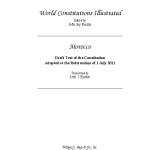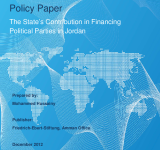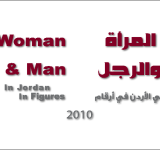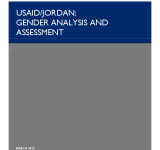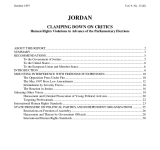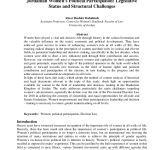parties
This paper examines issues concerning the state's financial contribution to political parties. It argues that the weakness of parties' financial resources limits their ability to engage in political activities and elections. The purpose of this paper is thus to provide a number of options and recommendation to help decision makers form the state's system for financing political parties. It aims to provide suitable financial support for each political party;; encourage the development of political parties in Jordan;; raise the political efficiency of political parties;; develop their organizational structures;; and motivate parties to participate in political life at national and local levels. This paper analyzes the positives and negatives of four financing options and;; based on this analysis;; presents a suggested system to assist decision makers as they design the state's financing mechanism for political parties.
يوجز هذا التقرير أوضاع المرأة الأردنية من خلال جداول احصائية مصنفة حسب النوع الاجتماعي;; ويرصد بشكل مختصر أبرز المنجزات التي تم تحقيقها;; وكما يشير إلى الفجوات الواجب معالجتها.
The report presents an up-to-date analysis of gender disparities in Jordan to inform development assistance programs by the USAID for the 2013-2017 strategic plan. The assessment report is prepared by the Global Health Technical Assistance Project;; funded by USAID Jordan and therefore;; it is based on a literature review and field work of the 21 focus group discussions held in Amman;; Irbid;; Tafileh and Zarqa. The report establishes that Jordan has begun to transition to a knowledge-based economy with the national advantage as its people. It also points out that despite the investments that have helped address gender equality issues;; Jordan continues to bear low female participation in the labor markets;; gender stereotypes about the role of females and males and conservative cultural norms. The report includes a sector-by-sector analysis;; recommendations;; gender review and an illustrative implementation plan. It concludes with key recommendations on the wide breadth of the USAID Jordan portfolio with a key emphasis on gender issues.
Freedom of expression and press freedom are essential conditions for the conduct of free and fair elections. But in the pre-election period;; Jordanian authorities have used the laws in force;; and other means such as threats and intimidation by internal security forces and government officials;; to restrict free expression;; including press freedom;; in violation of the International Covenant on Civil and Political Rights (ICCPR);; which Jordan has ratified. This report documents a series of actions taken by the government to tame the print media -- including the temporary closure of thirteen weekly newspapers in September -- and intimidate political critics into silence. Journalists and editors told Human Rights Watch that they have followed a stricter regime of self-censorship since the amendments to the press law were implemented in May 1997;; for fear of being subjected to heavy financial penalties mandated under the new law. In addition;; students;; writers;; and researchers have faced a variety of sanctions -- ranging from detention;; criminal prosecution;; and imprisonment to harassment;; job loss;; and blacklisting -- because they expressed views on political subjects that the government preferred remain off-limits. Such measures have created an atmosphere in which the right to free expression is perceived by many in Jordan as under siege.
This study sheds light on the status of legislative drafting in the Jordanian legal system. It explores both the parties entrusted with the drafting of legislation as well as the entities that aid the drafting. In addition;; the paper looks into legal problems that arise during implementation and the effects on the quality of the legislative product. The study adoptes a descriptive approach to identify and answer the research questions.
This study sheds light on opportunities available to women in the field of leadership and decision- making in the Hashemite Kingdom of Jordan. It explores the main challenges impeding women's advancement;; especially the debate over the role of the Provisional Election Law for 2010 in achieving the concepts of citizenship;; and equal opportunities for all male and female Jordanians. In order to answer the research questions;; the study analyzed historical and legal documents.
